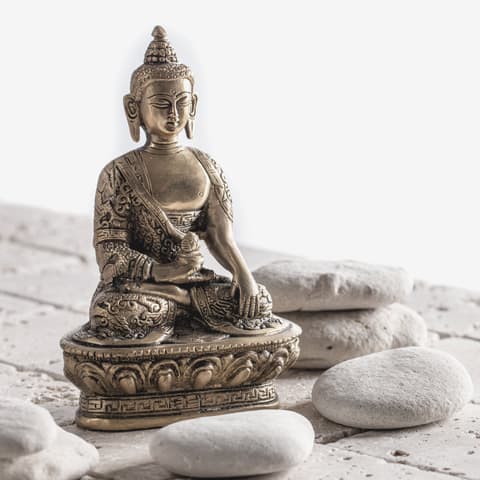Mindfulness is a term that has become increasingly more popular and widespread. As a practice, it is something that has already conquered many individuals around the world and has interested most others. However, with the vast amount of information about it, it is easy to be confused about certain aspects – primarily how it interacts with our spiritual life.
Mindfulness is not a religion, but it can be practiced as a spiritual practice if you believe that’s right for you. It has its roots in Asian religions. However, it has developed to be at the reach of anybody, regardless of religious orientation. Mindful living can encompass most religions.
Whether you are already practicing mindfulness or you are just approaching the thin new company, it is crucial to understand how this practice can be part of your daily life. Find out all below.
The Origins of Mindfulness
If you believe that mindfulness has religious origins, you are right. This practice has always been tied to contemplative religious traditions that come mostly from some Asian countries. Indeed, mindfulness is a practice commonly associated with Buddhism, Taoism, Stoicism, and, in particular with Hinduism.
These religious practices are incredibly different, but they all have in common the importance of being present in the moment and raising awareness of yourself, the environment around you, and the relationship you are creating with those around you.
This kind of living is also at the core of cultivating compassion. In religious practices and beyond, compassion is considered essential to creating a heightened awareness of our surroundings and act in a way that is mindful and respectful of our world.
However, mindfulness was not born in a place and at a particular time. Undoubtedly, we can notice its presence in the religious practices seen above. However, silence, meditation, and mindful contemplations are also part of many other cultures and religions.
Indeed, it is possible to trace these practices back to some aspects of the Catholic religion and Jewish Shabbat.
When considering origins outside of religion, it is possible to notice that mindfulness was also present in other aspects of lives, such as politics, medicine, and philosophy. Seneca, Marcus Aurelius, and Epictetus were all advocates of contemplation, awareness of experience, and being present in the moment.
While they did not label these practices “mindfulness,” they were operating in the principles of this way of living.
Today, mindfulness has been studied, defined, and applied in many fields, including healthcare, politics, entrepreneurship, and psychology. Nonetheless, it has changed radically to be able to fit our lifestyle.
How Is Mindfulness Linked to Religion?

As we have seen above, mindfulness has its roots in religion. However, mindful living is much more entwined with the spiritual and religious life that we might realize. Indeed, mindfulness has been extracted from Hinduism and other religions to be accessible to all people.
When defining what mindfulness is, there are several definitions of the available terms and can be explored. However, they often refer to a specific way of incorporating mindfulness into our lives. Indeed, you might find that a definition refers to it as part of religious practices, while others focus on its benefits on body and mind.
When it comes down to understanding what this type of living is and how it is connected to how we live our everyday life, it is possible to define it as the practice of paying attention to a moment, intentionally and with compassion.
Mindfulness can be practiced as part of your meditation session, but it can also go much beyond that, encompassing all aspects of our daily lives – from how we brush our teeth to how we eat.
Brilliant Mindfulness Executive Director Sarah Rudell Beach defines mindfulness as just being part of our experience as humans. Daniel Rechtschaffen, educator and Marriage and Family Therapist, compares mindful living to a breath, meaning that it passes through us. Still, it does not belong to us or any religion and secular institution.
Ultimately, mindfulness is considered the practice of raising our awareness of ourselves and the ones around us, putting intention into our actions and thoughts, and living our daily experiences to their fullest. So, it is easy to see how this practice can encompass all religions.
Mindfulness Can Serve You As You Need
Whether you practice mindfulness or just approaching this new concept, you are not new. Indeed, you might have experienced it many times in your life without giving that feeling the name of “mindfulness.”
If you have ever put all of your focus on what you eat or be so immersed in a book that your mind got wholly captured by it, you have experienced mindfulness. After all, this practice is nothing more than putting all of our attention on the task, experience, moment, throughs, or feelings that are in our lives at a particular moment.
Because of all this, mindfulness can truly serve you as you need. It does not have to be a religious practice if that’s not what works for you. However, you can practice it as a form of religion if that is something that you believe will bring you the most significant benefits.
Mindfulness has been beneficial as a therapy since the 1970s and in several different fields. Since then, several frameworks and models have been developed for this practice to yield the highest benefits for a particular practitioner.
Because of these studies and research, today, you can approach mindfulness in a way that feels the most comfortable to you – and the one you believe will bring the most significant benefits into your life.
Could Mindfulness Be Considered a Religion?
Mindfulness is not labeled as a religion, but it is part of several religious practices. You can practice mindfulness as a spiritual practice on its own if you don’t feel an association with the religion that requires you to practice mindfulness.
For example, mindfulness is a vital part of certain contemplative religions such as Hinduism or Buddhism. However, you don’t necessarily need to leave your faith behind and become Hinduist or Buddhist to practice mindfulness.
Indeed, you can just bring mindfulness into your life through meditation sessions. Or, if that feels more comfortable to you, you can make your prayers more mindful. In any case, you won’t need to renounce your current faith or believe in being more mindful in your daily life!
Can Mindfulness Be a Non-Religious Practice?

If you wish to complete your mindfulness practice wholly separated from your religion, that is possible too. You can incorporate mindfulness in the way you exercise, eat, or even relate to others. Everything you will need to do is create intentional awareness at that moment and act with compassion.
However, it is worth noting that you are likely to raise your self-awareness and become more conscious of the actions you take during your daily life during your mindfulness practice. Depending on your viewpoint, this can be a spiritual and philosophical attitude similar to religious practice.
As Tim Ryan mentioned in its A Mindful Nation, practicing mindfulness does not require you to give up your faith, take on a new one, or become more religious if that is not something you wish to do.
Additionally, the way you practice mindfulness is something that can genuinely make a difference in the outcome of your practice. You could take on a much more spiritual approach to it, incorporating Hinduism practices and spending time meditating cross-legged.
Or, you could just pay more attention to the words you say to others, the food on your plate, and what happens during the days. And so you have non-religious mindfulness into your life!
Mindfulness and Atheism
Mindfulness is not something that has to be excluded as a priority by atheists. Because it does not require you to take on any religious beliefs, it can perfectly fit the needs of those atheists who need to find a center in their daily lives.
Indeed, stress is part of our daily lives, and if we react to stimuli coming from the external environment, it is easy to feel frustrated and overwhelmed. Mindfulness can be the way to attach yourself to a specific moment and have full control over it rather than be pushed around by all the events in our lives.
Mindfulness as a Medical Practice
It had long gone when mindfulness was only part of certain religions of the East. Since the late 1970s, the practice of mindfulness has been acclaimed for many other benefits it could bring into our lives. More importantly, its use in medicine, clinical psychology, and psychiatry has revolutionized how we deal with and treat several medical conditions.
It all started with professor Jon Kabat-Zinn, who conceptualized and brought to life the Mindfulness-Based Stress Reduction (MBSR) program. Studied and implemented at the University of Massachusetts, this program has been seen to yield incredibly positive effects when applied for treating several medical conditions.
Today, both this program and the application of mindfulness in medicine and psychology has been developed much further. It is possible to find several frameworks, models, and programs that have been explicitly designed to treat certain conditions and disorders. Nonetheless, these programs have been seen to be beneficial for healthy and unhealthy people alike.
Some of the ways this practice is used include treating drug addiction, obesity, stress, anxiety, depression, and many more. Healthy people have appreciated mindfulness’s benefits when it comes down to enhancing athletic performance, managing weight, and healthy aging.
Because of this impressive array of benefits that it can yield in the field of medicine, healthcare, and wellbeing, mindfulness programs have been introduced in specific veteran centers, prisons, schools, and hospitals.
All this evidence clarifies that, while it can be considered a medical practice, mindfulness is not necessarily connected to a religion. Indeed, its power of centering the mind and bringing our awareness to the present moment or action can help us in many aspects of our lives.
While some individuals might still find mindfulness in their religious practice, anybody can engage in mindfulness without necessarily committing to religious traditions or beliefs.
How to Introduce Mindfulness in Your Daily Life
Whether you wish to introduce mindfulness into your life in a spiritual or non-spiritual way, mindful living is all about connecting with the environment around you, setting an intention for your actions, and cultivating compassion.
These won’t have to involve religious practices, initiations, or even developing some belief. Nonetheless, it is crucial to practice mindfully over time and make it part of your routine to start seeing a real shift in your life and environment.
Here are some ways to consider incorporating mindfulness into your life beyond any religious life you might be practicing.
Set a Mindful Intention for the Day

It all starts in the morning! The moment you wake up – and the actions you compete straight after this moment – can truly change how the day ahead will go. Therefore, it is crucial to make the most out of these precious moments in the morning.
You can do all this and more without having to change your routine or daily life completely. Indeed, it is enough to set an intention for your day when you wake up. The process of developing an intention allows you to connect your desires and thoughts to your actions. As a result, you will notice that your efforts are more in line with your words, intentions, personality, and goals.
You can start setting an intention by sitting in a relaxed posture on your bed just after you wake up. From here, take three nourishing breaths, close your eyes, and start building awareness about what is happening around you.
You can now ask yourself what intentions you want to set for the day and the impact that these might have on your life. Now you can place an intention that feels right for the day ahead. Check yourself throughout the day to see whether this connection has materialized.
Eat Mindfully
What we eat and how we eat have a significant impact on our wellbeing and health. Today, we are used to putting the TV on and eating in front of it, barely understanding what’s on our plate or what we put in our mouths.
Starting to build this kind of awareness is not easy, especially as it involves overriding certain years-long habits. Nonetheless, this can be the answer to many health issues we are all dealing with.
Next time you have a meal, bring mindfulness into it. You can do so by breathing three times before starting to eat and actively listening to your body through the process of eating. Eat calmly and peacefully, breathing in between bites and truly tasting each flavor in your mouth. Keep listening to your body throughout your meal, and stop when you feel that your body is full and satisfied.
Keep up this new routine throughout your day and weeks, always eating when you genuinely feel hungry. Depending on your current diet, you might also look into the relationship between a plant-based diet and mindful living.
Take a Mindful Break
Has it ever happened that you complete a task in “autopilot” just to forget that you have gone through the process of going through that task altogether? This kind of behavior is widespread and can influence most of our daily and routine actions.
However, this is something completely different from mindfulness. If you wish to embrace a more mindful living, you might consider putting intention and awareness into every action you get involved with. Whether it is preparing food or wrapping a present, make sure there is some intention in your actions!
Move Your Body Daily
Our minds and bodies share a connection that is far greater than we often realize. One can significantly affect the other and vice versa. Moving your body daily and with mindfulness can help you achieve your fitness goals and much more than that.
Some types of mindful practices – such as yoga – can help you develop a greater awareness and respect for your body. Indeed, you can start working towards balance and flexibility or just start appreciating your body and the way it moves. Don’t forget that meditation can be part of our daily lives and play a significant role in our training and exercise.
Practice Meditation
Meditation is, of course, a great way to introduce mindfulness into your life. This practice is easily accessible by most, as even sessions as short as 10 minutes per day can have a tremendous impact on your wellbeing. Indeed, meditation can help you keep at bay stress, manage your emotions, and start building awareness of your thoughts, feelings, and emotions.
Is Mindfulness a Religion: Conclusion
Mindfulness cannot be considered a religion per se, even if it has roots in Asia’s faiths. Indeed, it has always been part of religions such as Hinduism and Buddhism. Mindfulness can be practiced as a non-spiritual practice or as a spiritual one.
Because it encompasses all the aspects of our lives, the way we behave, and the awareness we have of ourselves, mindfulness encompasses all religious practices and much more. You won’t need to leave behind your faith to start practicing mindfulness, something accessible to everybody independently from religious beliefs.








